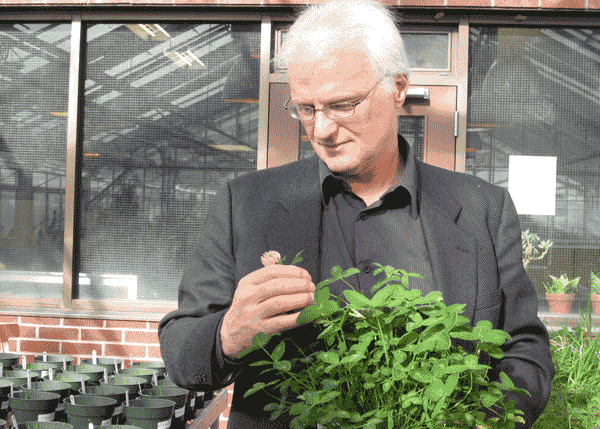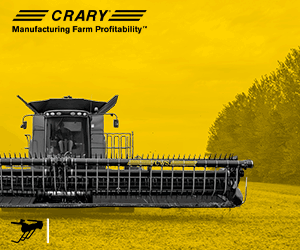Sharing the vision of sustainability
LOBLAW CHAIR IN SUSTAINABLE FOOD PRODUCTION LEADS INNOVATIVE RESEARCH IN AGRICULTURE AND FOOD
when dr. ralph Martin was growing up on his family’s beef and hog farm near Wallenstein, Ontario, the challenge facing agriculture was producing enough to feed the world. Today, Martin sees a shift from quantity-based farming to the need for sustainable practices and production of quality food.
“Agriculture’s task in the 21st century is to build a resilient system based on healthy soil, clean air and water and regenerative energy that will supply high quality food for all,” he says.
Martin, who taught plant science at the Nova Scotia Agricultural College for over twenty years, was recently appointed to the position of Loblaw Chair in Sustainable Food Production at the Ontario Agricultural College, University of Guelph.
His position – the first of its kind in North America – was created through a $3 million commitment from Canada’s largest food distributor. It is focused on advancing collaborative research efforts in sustainable production as well as guiding the development of national agriculture and food policy.
exploring our food
Throughout his role Martin works with various teams of students, researchers and other professionals to advance the study of sustainability. One of his current projects is focused on better understanding household food waste and involves professionals from psychology, marketing and food sectors.
“We often hear that farmers have to grow more food to meet the demand of the growing population but 40 percent of our food is currently being wasted, so we need to explore where waste is happening and encourage people to waste less,” says Martin.
DR. RALPH MARTIN

He notes that the production focus of crop farmers could shift from quantity to quality if households are successful in reducing organic waste. “If people maintained the same food budget as they have in place today but wasted less, the demand for higher quality food would grow.”
While there is always room to improve, Martin says that farm operations are more efficient in waste reduction than most households. Technology in grain drying and use of computer systems to monitor humidity is an example of a job well done, he adds.
sustainability in the field
Research focused on primary agricultural practices is also an important component of Martin’s role. He is currently collaborating with other University of Guelph researchers to improve clover uniformity in winter wheat and incorporate forages into corn, soy and wheat rotations more effectively. “Covering soil and building organic matter are very important for long term sustainability,” says Martin.
He began researching how to grow forages between rows of corn and soybeans while teaching in Nova Scotia and plans to continue these trials in Ontario. “Farmers are struggling with time pressures so our job is to make new practices as profitable and efficient as possible at the research level,” he says.
Martin is also looking for ways to grow biomass crops with sustainability in mind. “Our farmland is being asked to produce food, feed, fibre and fuel and while food needs to be our top priority, we also need things like heat.”
Using biomass crops strategically could enable growers to cover soil, build organic matter and produce energy at the same time. He says the key is using fuel products locally and transitioning from the mindset of selling switchgrass to selling heat.
Making a clear distinction between food and feed is another part of Martin’s vision for a sustainable future. “There is an overlap right now between what we grow for food and what we grow for feed,” he explains. “Livestock farmers will soon need to focus on growing feed that is inedible to humans because the agriculture industry will not be able to afford to feed food to livestock.”
opportunities for grain farmers
In addition to improving current production methods, staying alert to new opportunities to grow quality food is on Martin’s list of action items for Ontario farmers.
“Grain farmers have a high productivity capacity,” says Martin. “But focusing on adopting high value food crops, reducing waste and taking care of the land are important principles to guide sustainability.”
The potential of pulse crops such as beans and lentils is one of the opportunities Martin is currently exploring. These nutritious crops can be grown for human consumption and are demanded by health-conscious consumers and immigrant populations, he says.
For grain farmers currently developing long term business plans, Martin’s message puts a spotlight on transitioning from a commodity business to a business meeting the need for high quality food.
future outlook
Acknowledging that a fully sustainable food system will not come without policy changes, Martin also leads research in government mandates.
“Because healthcare costs are so high, we are researching a program where providing free Ontario fruits and vegetables to low income households may actually be less expensive than paying healthcare bills,” he explains. Determining the feasibility of taxing unhealthy foods while using tax income to fund home economic classes is also an ongoing project.
With a wide range of research initiatives under his leadership, Martin’s role is ultimately about planning for what’s next in agriculture and food.
“If the 20th century was about production economies of scale, the next challenge is growing the right kinds of quality foods and doing it in a way that enables us to continue to do so in the future – that’s sustainability,” he says. •








